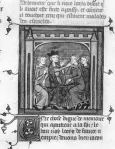Can placebo heal? Can placebo provide a short term burst of hope based on belief? Remember from our first post that from Latin placebo means ‘I shall please’ whereas Nocebo means ‘I shall harm’. Just how powerful are words of power, thoughts and beliefs?
With these definitions in mind, consider the following stories. They powerfully demonstrate how belief systems can either turn on or turn off the will to live and how inexplicable healing can sometimes occur through belief. Consider the power of Sovereigns to heal in medieval times and the power of prayer
It is interesting to remember how the Royal Touch was believed to heal and  bless. With the spread of Christianity, monarchs were seen as religious figures with magical or curative powers. It was believed that Royal Touch, the touch of the sovereign of England or France, could cure diseases due to the devine right of sovereigns. Members of the royal courts often propagandized that those receiving the Royal Touch were miraculously healed. André du Laurens, the senior physician of Henry IV, publicized findings that at least half of those that received the Royal Touch were cured within a few days. Then we have the story of St peregrinus – the Patron Saint of Cancer.
bless. With the spread of Christianity, monarchs were seen as religious figures with magical or curative powers. It was believed that Royal Touch, the touch of the sovereign of England or France, could cure diseases due to the devine right of sovereigns. Members of the royal courts often propagandized that those receiving the Royal Touch were miraculously healed. André du Laurens, the senior physician of Henry IV, publicized findings that at least half of those that received the Royal Touch were cured within a few days. Then we have the story of St peregrinus – the Patron Saint of Cancer.
Near the end of the thirteenth century a zealous young priest of the order of

Servites fell ill with a painful cancer of the foot. He bore his trial without a murmur and, when it was decided that amputation should be performed, he spent the night preceding the operation in prayer before his crucifix. He then sank into a light slumber from which he awoke completely cured—to the amazement of the doctors who could no longer detect any trace of the disease. The holy man lived to the age of eighty and died in sanctity. He became known as St. Peregrinus, the patron saint of cancer.
In this context – I introduce two other sources for placebo – Both are from an indigenous source. I encourage you to consider the difference between an uneducated person who accepts their cultural beliefs and background including those in authority and our current Western style culture where education levels are a higher standard and where tradition and authority is often scorned or rebelled against. Did these simple beliefs and rituals have a ‘magical’ placebo effect?
The following stories from the 1800’s were both recorded by medical physiologist Walton Cannon and concern Australian experiences – the first one being an indigenous Australian account and the second – a Kanaka from the Polynesian Islands. From his diary he states:
“Dr. S. M. Lambert of the Western Pacific Health Service of the Rockefeller Foundation wrote to me on several occasions as he had seen evidence of death from fear. In one case there was a startling recovery. At a mission at Mona Mona in North Queensland, were many native converts, but on the outskirts of the mission was a group of non-converts, including one “Nebo”, a famous witch doctor. The chief helper of the missionary was Rob, a native who had been converted. When Dr. Lambert arrived at the Mission he learned that Rob was in distress and that the missionary wanted him examined. Dr. Lambert made the examination, and found no fever, no complaint of pain, no symptoms or signs of disease. He was impressed, however, by the obvious indications that Rob was seriously ill and extremely weak. From the missionary he learned that Rob had had a bone pointed at him by Nebo and was convinced that, in consequence, he must die. Thereupon, Dr. Lambert and the missionary went for Nebo, threatened him sharply that his supply of food would be shut off if anything happened to Rob and that he and his people would be driven away from the mission. At once Nebo agreed to go with them to see Rob. He leaned over Rob’s bed and told the sick man that it was all a mistake, a mere joke…indeed, that he had not pointed a bone at all.
The relief, Dr. Lambert testifies, was almost instantaneous. That evening Rob was back at work, quite happy again and in full possession of his physical strength.
A less fortunate outcome is reported in the next account.
